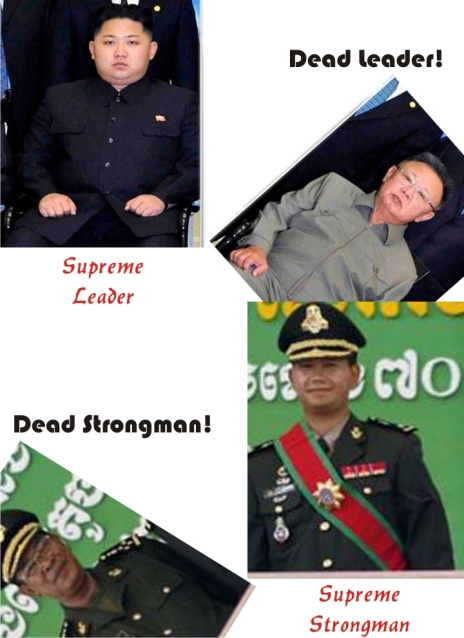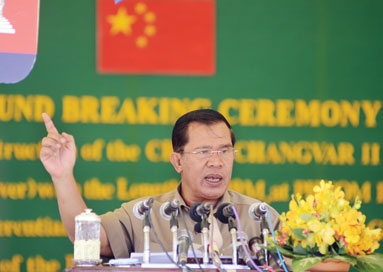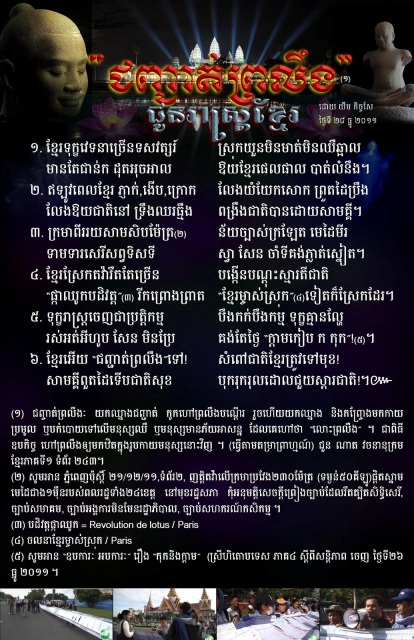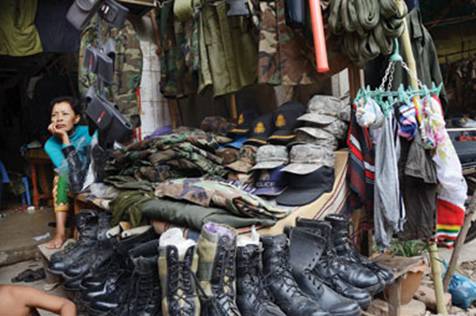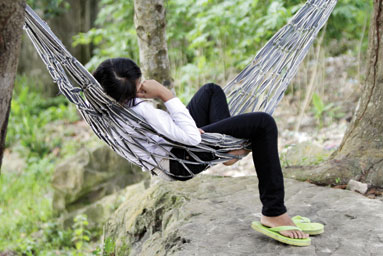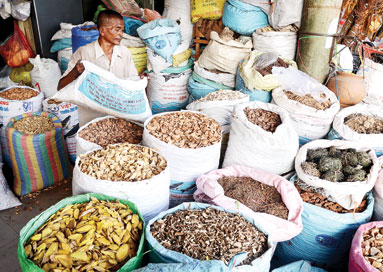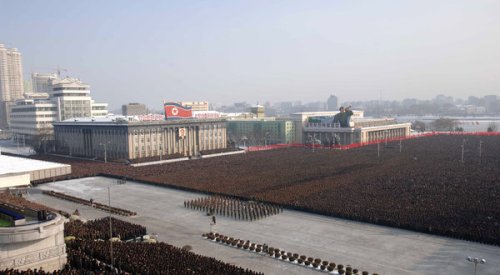 |
| Thousands of North Koreans participated in a memorial service for Kim Jong-il in Pyongyang on Thursday. (Korean Central News Agency, via Agence France-Presse — Getty Images) |
At Huge Rally, North Koreans Declare Kim Their Leader
December 29, 2011
By CHOE SANG-HUN
The New York Times
SEOUL, South Korea — North Korea publicly declared the young heir Kim Jong-un its supreme leader at a huge rally on Thursday in Pyongyang that culminated with his ascent to the top of the hermetic Communist nation after nearly two weeks of national mourning for his father, Kim Jong-il.
A crowd of tens of thousands, most of them uniformed soldiers, packed the plaza — named after Mr. Kim’s grandfather, the North’s founding president, Kim Il-sung — and those gathered swore their allegiance to the dynastic transfer of power. The event, a memorial service for Kim Jong-il, who died on Dec. 17, capped 13 days of mourning and introduced the era of his son.
“Respected Comrade Kim Jong-un is now supreme leader of our party, military and people,” said Kim Yong-nam, the president of the North Korean Parliament, who is considered the ceremonial head of state. “He inherits the ideology, leadership, courage and audacity of Comrade Kim Jong-il.”
Addressing the crowd, Kim Yong-nam also asked North Koreans to “solidify the monolithic leadership” of Kim Jong-un, who is believed to be in his late 20s.
In the last few days, North Korea has showered Kim Jong-un with the honorific epithets reserved, until now, for his father: “great leader,” “dear leader,” “peerless leader,” “the sun of the 21st century,” and even eobeoi, the Korean word for parent, which North Korea had used only for Kim Jong-il and his father, Kim Il-sung.
The ceremony on Thursday was particularly symbolic of the son’s rise to top leadership: for the first time since his father’s death, he was facing a massive crowd of North Koreans alone — without his father standing by him.
Though North Korea declared Kim Jong-un its top leader throughout the carefully choreographed ceremony, and in relentless pronouncements of the past week, he has yet to take any official titles, like supreme commander of the 1.2 million-strong Korean People’s Army and general secretary of the Workers’ Party. Those are bestowed at meetings of top party and government representatives, most likely in the coming months, that in the past have been mere formalities.
From a balcony, with top party and military officials standing behind him, the new leader looked over the snow-covered plaza, where people stood in neat rows. He was dressed in a black greatcoat — like the one favored by his grandfather, a godlike figure among North Koreans whom the young leader appeared to copy in dress, demeanor and physique.
In September 2010, Mr. Kim was unveiled as the future successor to his father, who had a stroke in 2008. After Kim Jong-il’s sudden death on Dec. 17, he was rapidly elevated to the top military and party posts, though without official titles.
How much he had consolidated his grip on power before his father’s death, and whether he would have to depend on caretakers or even regents, remained topics of intense speculation and contention among outside analysts. All indications from the North, however, suggest that he will not share power with anyone, at least in the public eye.
North Korea has said that the “great successor,” as the young Mr. Kim has been called, will faithfully follow his father’s songun, or “military-first,” policy, which has raised tensions with Washington and Seoul.
In his speech, Kim Yong-nam, the ceremonial head of state, credited that policy with “turning our fatherland into a global military power and a proud nuclear-weapons state.” Under Kim Jong-il, North Korea conducted two nuclear tests, in 2006 and 2009.
The government often stages huge rallies or military parades at Kim Il-sung Plaza to mark important state events and demonstrate unity.
At noon Thursday, the country observed three minutes of nationwide silence in memory of Kim Jong-il. Trains and ships sounded their horns, state news media reported. Similar but smaller ceremonies were held in cities across North Korea, the country’s official news agency, K.C.N.A., reported.
On Wednesday, as the funeral motorcade traveled through the capital, Pyongyang, North Koreans lined the streets weeping and wailing over the death of the man who, bolstered by a state-orchestrated cult of personality, had ruled their country for 17 years.
The funeral showcased seven senior party and military officials who are believed to be mentors or major aides to Kim Jong-un. They included Jang Song-taek, Mr. Kim’s uncle and a vice chairman of the National Defense Commission; Kim Ki-nam, North Korea’s propaganda chief; Choe Tae-bok, the party secretary in charge of external affairs; Vice Marshal Ri Yong-ho, head of the military’s general staff; Kim Yong-chun, the defense minister; Kim Jong-gak, a four-star general whose job is to monitor the allegiance of other generals; and U Dong-Chuk, head of the North’s secret police and spy agency.
The rising status of those seven men was confirmed Thursday when Rodong Sinmun, the Workers’ Party’s official newspaper, released a photograph that showed them standing with Mr. Kim as he paid his last farewell to his father shortly before the funeral procession began on Wednesday.
On Thursday, the newspaper’s Web site also carried photos of Mr. Kim and the seven men walking alongside the hearse during the procession. It identified them as “key figures who will lead the party and military during the Kim Jong-un era.”

